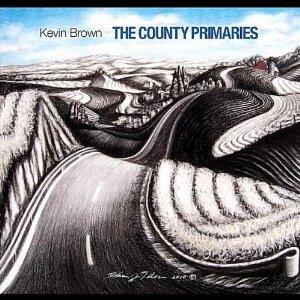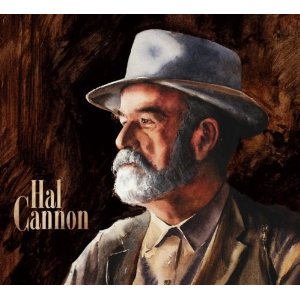Prime The Pump. Have Faith And Believe.
New albums by Kevin Brown and Hal Cannon are on intimate terms with the sky above and the earth below
By David McGee
THE COUNTRY PRIMARIES
Kevin Brown
Kevin Brown
HAL CANNON
Okehdokee RecordsKevin Brown and Hal Cannon love nature and the land but how that love makes an impact on their captivating music is where things get interesting in considering their new albums.
Brown’s online bio says he hails from rural eastern Washington “where the arid Columbia Basin Plateau meets the Ponderosa Pine forest of the Selkirk Mountains.” The key, though, is the bio’s comment about how Brown’s music addresses “the interwoven fabric of nature and humanity.” In exploring matters relating to faith, family, self-worth, romance and similar weighty issues, Brown’s characters are often either at odds with, buttressed by but never separated from the natural world. On The County Primaries, the scenes Brown paints in his lyrics are defined by lightning strikes, gusts of wind, wooded areas, rainbows, fallow fields, Indian Summer, all God’s creatures, the moon and big blue skies, mountains and canyons and water—always water, the most fundamental of life’s building blocks.
The laconic, graceful rhythm of “On the Line” seems to be propelling a rustic ode to fishing’s pleasures—indeed, the bright fiddle (courtesy Caridwen Irvine-Spatz) and singsong pedal steel (Burke Carroll) do their best to conjure a lazy, riverbank kind of vibe—but fishing is only a metaphor for the singer’s quest for something more fulfilling in his life—“a little heaven on the line.” Brown evokes Jesus walking on the Galilean water then turning it into wine as a kind of standard worth striving for in terms of radical change from within: “Being that it all begins with water, I’m leaving all these dusty roads behind,” he sings in his warm, welcoming tenor (sounding at times uncannily like the great Tom Russell), “I don’t know the stillness like I want to/I need a little heaven on the line.” One of Brown’s truly beautiful songs, “The Last Days of Indian Summer” (to which Irvine-Spatz’s fiddle and Carroll’s keening pedal steel add immeasurable poignancy), first takes the measure of the literal changing season (“the leaves are all restless to let go/the winter wheat sprouts in the fields/the sunflowers quietly bow down their heads…”) before concluding with a telling rite of passage that explains the narrator’s reflective mood: “Tamarack burns in the woodstove/It’s keeping me warm while I wait/Seems like she was just starting school/Tonight’s her very first date/Lord I know the passing of seasons/I hope she’ll be coming home soon…”
The farmer (possibly a stand-in for contemporary humankind in search of spiritual connection) contemplating his fallow land and—again evoking water’s life giving properties in the intense drive of “Fallow”; the husband getting frisky, noting “The moon is abreast of the new fallen snow/The sky is a dress and it’s cut very low/The stereo sings to us soft and low…,” in the gentle country come-on “Upstairs”; the seeker bent on finding his purpose in the tender, fireside ballad “Courted by Canyons,” his voice shadowed by the lovely harmonies of Laurie Bayers (memorable each and every time she appears, for the earthiness and soul in her voice) as he is humbled by the hand of God in nature (“and when the lightning bolt hit, I had to admit/That the journey begins on your knees”) and finally accepts his subservience to the elements, solemnly pleading: “Won’t you baptize me now, if the water allows me/To marry myself to the mud/As the red water flows in the banks of the arroyos/I’ll know I’ve been washed by the blood”--these and other characters in Brown’s cosmology are captured in their moments as evocatively as people were in the Hudson River School paintings of the 19th Century. Like the Hudson River School’s leading artists—Thomas Cole, Frederic Edwin Church, Asher Durand, Albert Bierstadt—Brown’s themes are those of discovery, exploration and settlement, and in his music (shaped not only by fiddle, pedal steel and Byers’s affecting harmonies, but also by various guitars, dobro, mandolin, some percussion and the stellar Eugene Jablonsky on bass) and especially in his lyrics, he manifests a belief in the natural world as a transcendent expression of God’s presence on Earth. If this sounds a bit heavy, be advised that The County Primaries is easy on the ears, gentle on the mind and a balm for the soul. The chorus of the Kingston Trio hit “Desert Pete,” written by Billy Edd Wheeler and given a delightful revival here, pretty much summarizes Kevin Brown’s aim. Fittingly it involves water. To wit: “You’ve got to prime the pump/You must have faith and believe/You’ve got to give of yourself ‘fore you’re worthy to receive/Drink all the water you can hold/Wash your face to your feet/Leave the bottle full for others/Thank you kindly, Desert Pete.”
Hal Cannon’s love of the land is specifically centered on the western region of the country. Based in Salt Lake City, Cannon is the founding director of the Western Folklife Center and its beloved Cowboy Poetry Gathering festival and has gone the extra mile in promoting western music as a member of the Deseret String Band. Drawing on his extensive catalogue of original songs, Cannon introduces himself on Hal Cannon as a singing storyteller whose evocative tales range from the Civil War era to a vividly imagined present day and are offered in graceful, subdued arrangements that rise to exalted planes on the strength of Cannon’s conviction and his partners’ spiritually transcendent musical accompaniment.
Cannon’s conversational singing is not going to satisfy those seeking vocal pyrotechnics but the cumulative effect of its friendly, easygoing timbre and his earnest phrasing gets under your skin. He so enjoys the landscape of his songs that a listener cannot help but be swept up in the journey as it unfolds. But however gentle these tales, some have dark pentimenti under their convivial outer markings—the old-timey “Suzanna,” familiar to some perhaps from a splendid version Tom O’Brien cut on his delightful Chicken and Egg album, is inspired by the plight of homeless veterans; you can get into a right good toe-tapping mood behind the swaying guitar-fiddle support and might miss the sadness at the root of the protagonist’s revelation, “fought in the war, don’t know which/fought in the war, I don’t know which/wake up moaning in a sandy ditch…oohh whoa, son of a bitch…” Similarly, “Alone Town” is a high-steppin’ strut of a song that Cannon more declaims than sings, but the lively pace set by Tom Carter’s banjo, Cathy Foy’s drums and an unidentified harmonica behind Cannon’s vocal might well take the edge off the story of an older man now feeling a stranger in his own home town as time changes everything around him. Get swept up in the intoxicating gypsy feel of the instrumental “Gretchen’s Song”—with its heady, atmospheric arrangement featuring piano, mandolin, oboe and fiddles darting all about the soundscape, rising, falling, intertwining and intermingling with each other while repeatedly returning to a curiously mournful theme—but be advised it is rooted both in Cannon’s despair over a close friend’s serious illness and his rising spirits as she rallied from her affliction.
Other songs are what they seem to be: the somber “Soldier’s Heart,” reflective and subdued as a backwoods hymn, which it sounds like, especially in its reverent a cappella opening verse, tears at the listener’s heart with its sorrowful lament for fighting men forever scarred spiritually by their experiences in battle—a heart tugging gem of deeply felt sympathy in a concise two minutes, 49 seconds. Based on a poem of 1860s vintage by Eugene Ware, “The Blizzard” is a saga set, indeed, on the night a blizzard blew in and a group of cattle herders, one a fiddler, whiled away the hours playing cards—all but one, that is, he being a prospector who had “lost his hopes in the Gypsum hills” and sat silent, staring vacantly but weeping openly when the fiddler played a minor-key refrain. When “the tempest ended,” the old prospector was dead, the others buried him and the fiddler stayed behind to offer “a requiem in a lonesome land in a mournful minor key.” Cannon sings the sad story a cappella, exits at the halfway mark of the five-minutes-plus number and leaves it to fiddler Flavia Cerviño-Wood to put the amen to it with that selfsame “requiem in a mournful minor key,” its stark melancholy evoking the chill that had enveloped the herders on the night in question.
But when Cannon gets out under western skies, he’s in his wheelhouse—you can hear the love he has for the big sky country in the tenderness of his singing in “That’s How It Is On the Range,” an overt homage to the land and all the life it harbors, with the woodwinds and strings lending the tune a classical tinge; and in the sprightly fiddle-guitar-mandolin attack on “Hittin’ The Trail Tonight,” based on a poem by Bruce Kiskaddon, an authentic cowboy who left the trail in 1926 to drive chariots in the original Ben-Hur movie, Cannon’s bright vocal betrays his ambition to do more than merely sing about mounting up—he’s bound to hightail it out into the great wide open himself.
Kevin Brown and Hall Cannon are artists in solidarity with the earth they walk on. Would that the rest of us could cultivate such intimacies with things that matter. You could say I’m a dreamer, but I’m not the only one…
Kevin Brown’s The County Primaries is available at www.amazon.com
Founder/Publisher/Editor: David McGee
Contributing Editors: Billy Altman, Laura Fissinger, Christopher Hill, Derk Richardson
Logo Design: John Mendelsohn (www.johnmendelsohn.com)
Website Design: Kieran McGee (www.kieranmcgee.com)
Staff Photographers: Audrey Harrod (Louisville, KY; www.flickr.com/audreyharrod), Alicia Zappier (New York)
E-mail: thebluegrassspecial@gmail.com
Mailing Address: David McGee, 201 W. 85 St.—5B, New York, NY 10024




